Bringing a new puppy into your home is one of the most exciting moments for any pet owner. However, along with the joy comes the responsibility of ensuring your furry friend gets the best possible start in life. One crucial aspect of this journey is selecting the best puppy food, which plays a central role in supporting your puppy’s growth, development, and overall health. With so many options available, understanding what to look for and which brands truly deliver on quality and nutrition can be overwhelming.
In this detailed guide, I’ll walk you through everything you need to know about the best puppy food options tailored to different needs—whether you have a large breed, small breed, or a puppy with sensitive stomachs or allergies. We’ll delve into essential nutrients, breed-specific dietary considerations, and practical feeding tips. Plus, I’ll review seven top-rated puppy food products renowned for their quality and effectiveness. Whether you’re scouting for budget-friendly options or premium recipes, this comprehensive overview will help you make well-informed decisions that will keep your puppy happy, healthy, and vibrant.
Understanding Puppy Nutrition: The Foundation of Healthy Growth
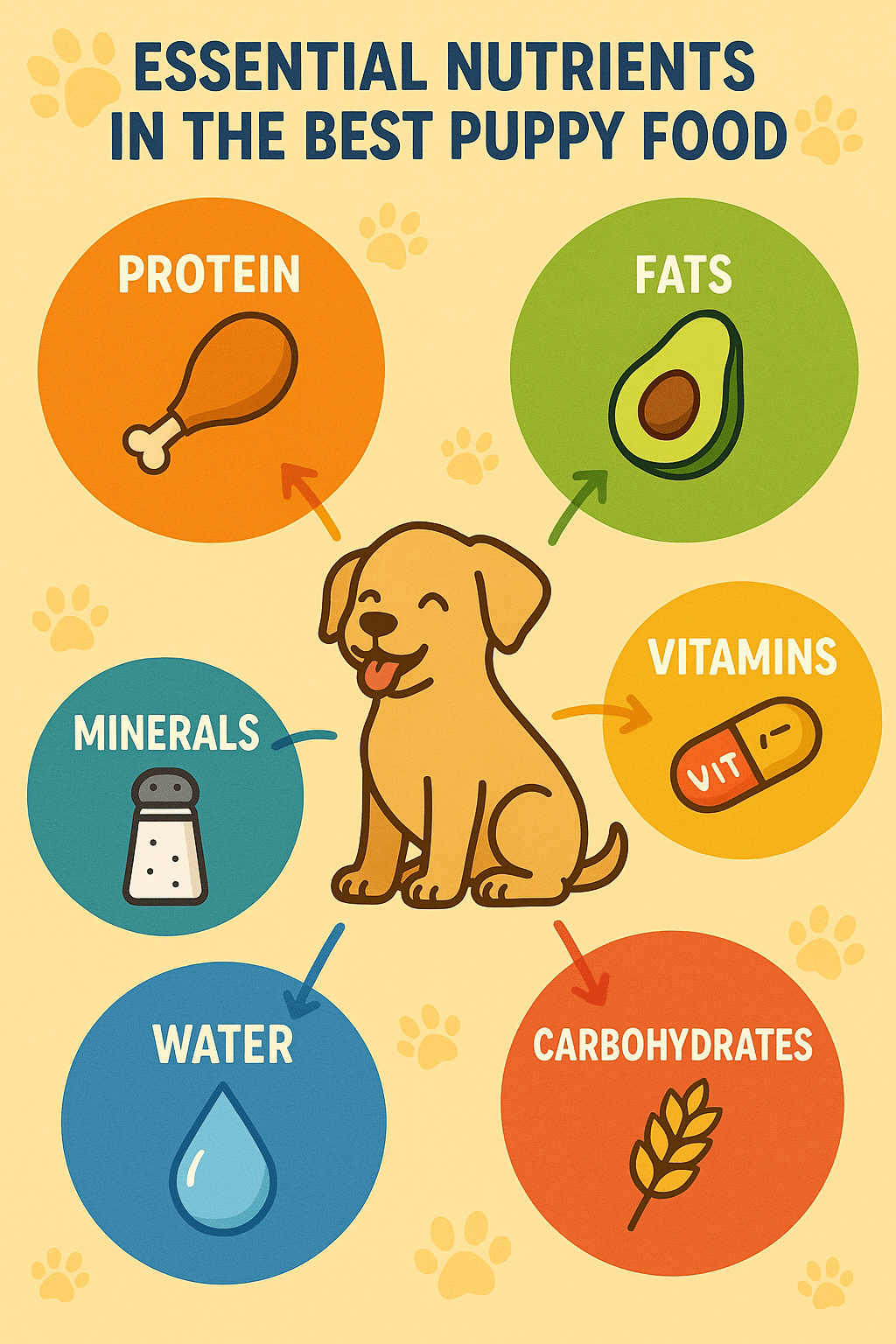
Every puppy deserves a balanced diet that provides the building blocks for strong bones, muscles, and a sharp mind. Puppies aren’t just mini-adult dogs—they have specific nutritional demands that differ greatly as they grow. Let’s unpack what makes a diet perfectly suited for a growing pup.
Key Nutrients for Puppies: Protein, DHA, Calcium, and More
At the heart of puppy nutrition is protein, the macronutrient critical for tissue repair, muscle growth, and immune support. Look for foods where high-quality proteins like chicken, fish, or lamb rank as top ingredients.
DHA (docosahexaenoic acid), an omega-3 fatty acid found in fish oil, is equally vital. It nurtures brain and eye development, helping puppies learn faster and see clearly.
Calcium and phosphorus regulate bone growth, which is especially important in larger breeds prone to joint problems later on. An excess or deficiency of these minerals can lead to skeletal deformities, so formulas that balance these precisely are essential.
Besides these, puppies also need a mix of vitamins (A, C, and E), antioxidants to support immune health, omega-6 fatty acids for skin and coat, and fiber for digestive wellness.
Breed-Specific Nutritional Needs: Large vs. Small Breed Considerations
Not all puppies are created equal—large and small breeds have distinct dietary needs.
-
Large Breed Puppies (expected adult weight over 50 pounds): These pups grow rapidly and need controlled calorie and calcium levels to avoid accelerated bone growth that can cause joint issues such as hip dysplasia. Large breed formulas also tend to include joint-supporting ingredients like glucosamine and chondroitin.
-
Small Breed Puppies: They have faster metabolisms and higher energy requirements per pound. Foods formulated for small breeds usually offer denser calories and smaller kibble size to make eating easier and more efficient.
Choosing breed-specific formulas helps ensure your puppy’s diet adapts to their unique growth trajectory and health requirements.
How to Choose the Best Puppy Food: Factors Pet Owners Must Know
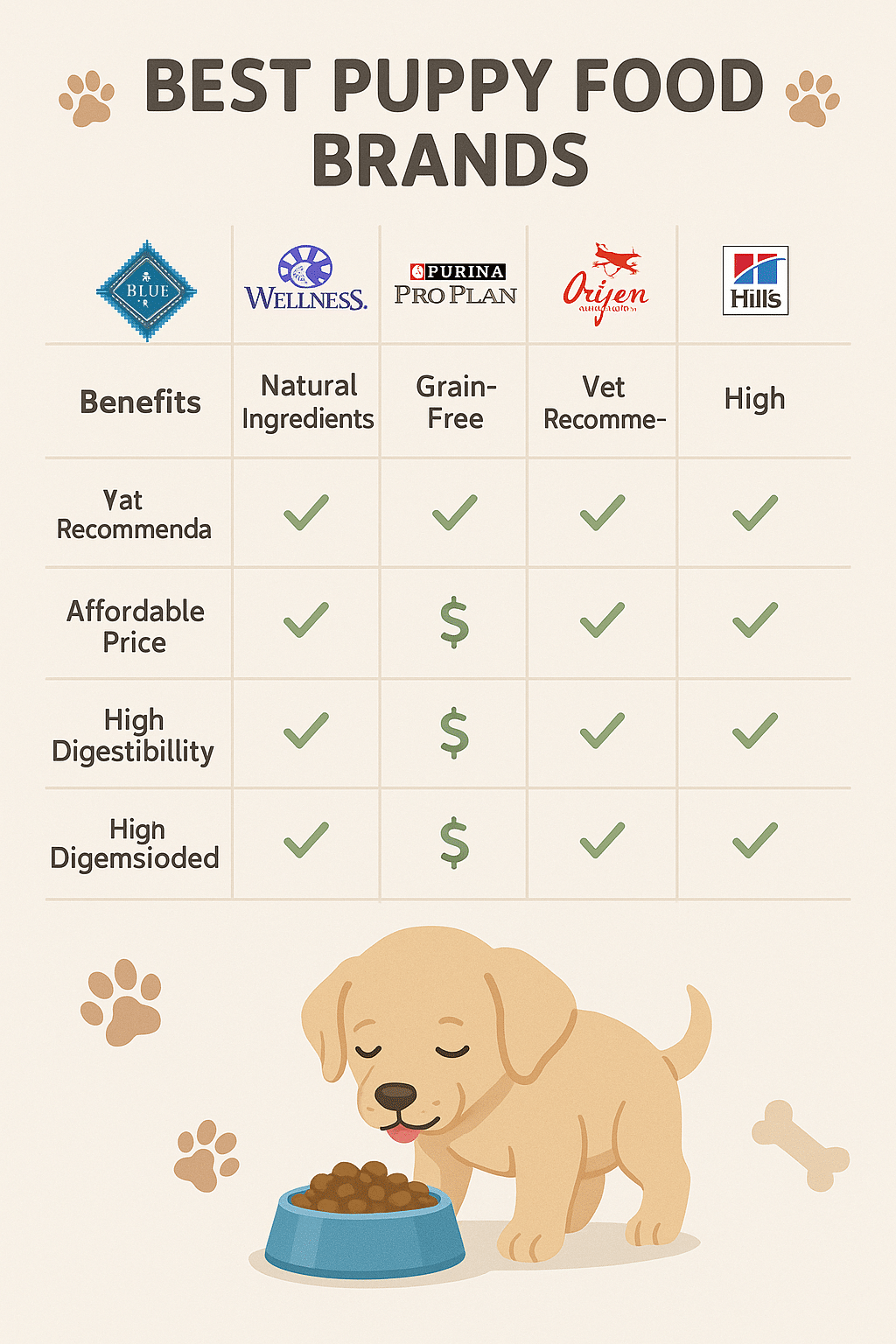
With the basics of puppy nutrition understood, let’s dive into what else you should consider when picking the best puppy food.
Importance of Ingredient Quality and Transparency
The best puppy foods emphasize natural, whole-food ingredients and list real meats as primary components—think “chicken,” not vague terms like “meat meals” or “animal by-products.” Avoid foods that rely heavily on fillers such as corn, wheat, or soy, especially if your puppy has a sensitive stomach.
Transparency in ingredient sourcing increases trustworthiness. Premium brands often disclose ingredient origin, quality assurances, and conduct thorough testing—features that set them apart from generic options.
Wet vs. Dry Puppy Food: Benefits and Drawbacks
Puppy food comes mainly in two forms: dry kibble and wet canned food. Let’s weigh the pros and cons:
-
Dry Food: Convenient, cost-effective, and promotes dental health by reducing plaque buildup. It also has a longer shelf life once opened and is easy to measure for portion control.
-
Wet Food: Moist, highly palatable, and enhances hydration, which is great for puppies who don’t drink much water. It’s also easier to chew and digest, making it ideal for teething or picky eaters.
Some pet owners mix wet and dry foods to combine benefits, but it’s important to balance calorie intake to prevent overfeeding.
Considering Special Dietary Needs: Sensitive Stomachs, Allergies, and Picky Eaters
Puppies can be sensitive to certain ingredients, triggering stomach upset or allergic reactions. Special formulas for sensitive skin and stomachs, often grain-free and with limited ingredients like salmon and rice, can help soothe digestive issues and promote a healthy coat.
For picky eaters, palatability is key. Foods with rich flavors, natural ingredients, and varied textures can encourage consistent eating habits during this critical growth phase.
Top 7 Best Puppy Food Options Reviewed
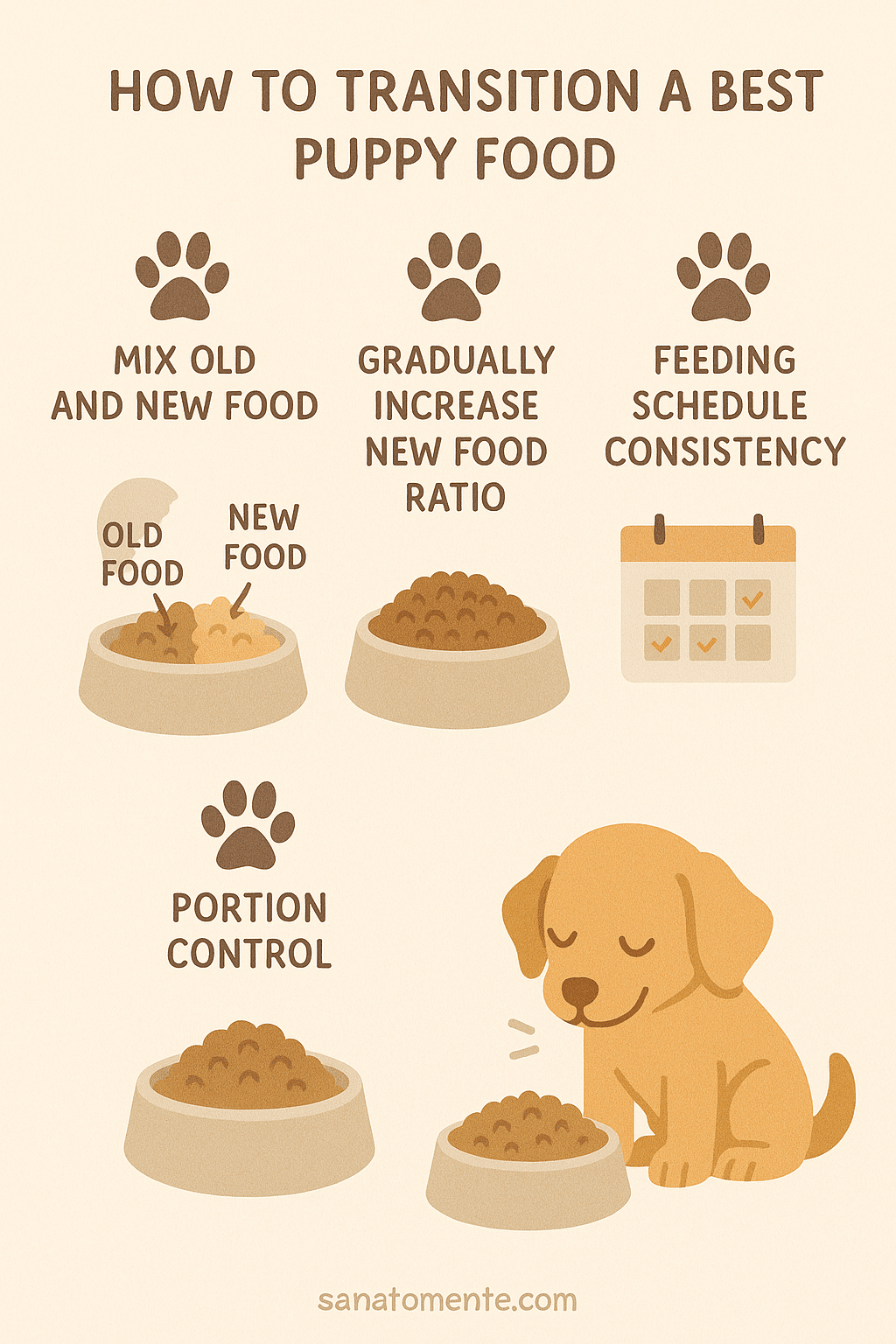
Now, here’s the heart of the article—the 7 best puppy food options I’ve selected based on nutritional quality, ingredient transparency, customer feedback, and veterinary endorsement:
1. Hill’s Science Diet Large Breed Chicken & Brown Rice Dry Puppy Food
Hill’s Science Diet Large Breed Puppy formula is expertly crafted for the controlled bone growth needs of large breeds like Labradors and Golden Retrievers.
Nutritional Benefits:
- Optimal calcium and balanced minerals to support healthy bone and joint development.
- DHA from fish oil for brain and eye health.
- High-quality protein to maintain lean muscle mass.
- Natural ingredients with no artificial colors or flavors.
Pricing and Availability:
- 15.5 lb bag at $49.99 and 27.5 lb bag at $74.99.
- Available via PetSmart, Hill’s Official Website, and Petco.
User Insights:
Many owners appreciate how it balances growth support without overly promoting rapid weight gain. Puppies remain active, with healthy developing joints and good digestion.
2. Purina Pro Plan High Protein Chicken & Rice Formula Dry Puppy Food
Focused on high protein content, this formula is perfect for active puppies who need strong muscle development.
Key Features:
- Real chicken is the first ingredient.
- Contains DHA for brain and vision development.
- Antioxidants to strengthen the immune system.
- Omega-6 fatty acids enrich skin and coat health.
- Free from artificial colors and flavors.
Where to Buy:
- Available in various sizes from 6 lb ($19.98) to 18 lb ($52.99) bags.
- Sold at Benson’s Pet Center, Petco, and PetSmart.
Customer Feedback:
Owners remark it’s particularly suitable for highly active puppies, showing maintained muscle tone and solid digestion.
3. Purina Pro Plan Puppy Sensitive Skin & Stomach Salmon & Rice Dry Dog Food
This is the go-to choice for puppies with digestive troubles or skin sensitivities.
Highlights:
- Real salmon as a high-quality protein source.
- Easily digestible carbohydrates from rice.
- Prebiotic fiber promotes a healthy gut microbiome.
- Omega-6 and vitamin A nourish skin and coat.
- DHA supports brain and vision.
Purchasing Options:
- Ranges from 4 lb to 24 lb bags.
- Available at PetSmart, Petco, and Purina’s official site.
User Stories:
Puppies with allergies or sensitive digestion show noticeable improvement in stool consistency and coat shine after switching.
4. Purina ONE +Plus Natural Large Breed Formula Dry Puppy Food
A comprehensive large breed formula featuring real chicken, glucosamine for joints, and DHA for cognitive growth.
Product Details:
- Contains no artificial preservatives or flavors.
- Balanced minerals for bone health.
- Glucosamine to support healthy cartilage.
Pricing and Sellers:
Expert Opinion:
This formula hits a sweet spot for owners wanting natural ingredients plus joint support geared for larger puppies.
5. Eukanuba Puppy Large Breed Dry Dog Food
Eukanuba is a name synonymous with quality and performance in puppy nutrition, especially for large breeds.
Key Ingredients/Benefits:
- Chicken protein to develop muscles.
- Balanced calcium/phosphorus for bone growth.
- DHA to boost brainpower.
- Prebiotic fibers for gut ease.
- Antioxidants like vitamin E for immune defense.
Sizes and Pricing:
- 4.5 lb bag at $21.99 up to 30 lb bag at $86.99.
- Available at PetSmart and Tractor Supply Co.
What Buyers Say:
Puppies show steady growth with a healthy appetite, digestion, and good coat condition, making it a top recommendation for large breeds.
6. Iams Proactive Health Large Breed Puppy with Real Chicken Dry Food
A scientifically designed formula with nutrients mimicking mother’s milk, ideal for comprehensive large breed puppy development.
Essentials:
- Real chicken as primary protein.
- Contains 22 vital nutrients.
- Omega-3 DHA for brain development.
- Antioxidants to boost immunity.
Pricing and Availability:
Owner Reviews:
Noted for good performance in energy levels and muscle tone, though some pups may require gradual introduction due to ingredient sensitivity.
7. Royal Canin Size Health Nutrition Large Puppy Dry Dog Food
Royal Canin’s specialized formula targets puppies expected to weigh between 56-100 pounds, ensuring balanced growth.
Standout Points:
- Mineral blend promotes bone and joint health.
- Antioxidant complex to strengthen immunity.
- DHA supports brain functions.
- Highly digestible proteins aid digestion.
- Prebiotics maintain gut flora balance.
Products and Prices:
- Available in 18 lb ($97.37) and 35 lb ($109.99) bags.
- Purchase at PetSmart, Petco, or directly on Royal Canin’s site.
Insights from Users:
Great for targeted large breed nutritional needs but should be introduced carefully to avoid digestive issues.
Feeding Guidelines: How to Properly Feed Your Puppy for Optimal Growth
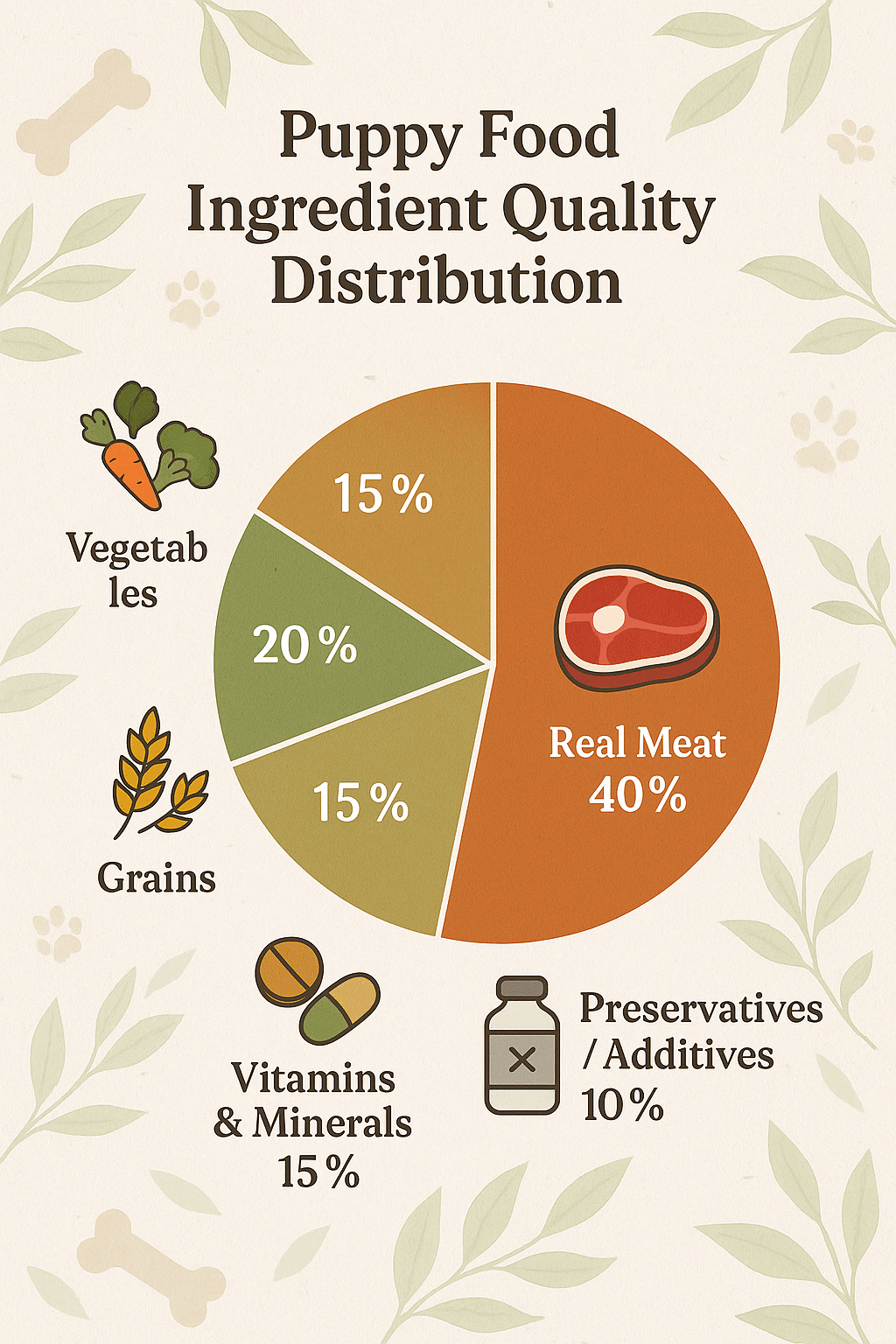
Now that you’ve selected the best puppy food, let’s talk about how to feed it right.
Portion Control by Breed Size and Age
Follow the feeding guide on your puppy food packaging, which usually adjusts servings based on weight and life stage. Puppy caloric needs decrease as they mature:
- Large breeds: Feed slightly smaller portions more frequently to avoid digestive stress.
- Small breeds: Higher calorie density is needed, so consider smaller, more frequent meals.
Tips for Transitioning Your Puppy to New Food
Switch foods gradually over 7-10 days to avoid upsetting your pup’s stomach:
- Day 1-3: Mix 25% new food with 75% current food.
- Day 4-6: Mix 50% new food with 50% current food.
- Day 7-9: Mix 75% new food with 25% current food.
- Day 10: Full new food.
Monitoring Growth and Adjusting Diet Accordingly
Keep an eye on weight gain, stool quality, energy levels, and coat condition. Consult your vet routinely to tweak feeding amounts or food types based on growth spurts or health needs.
Addressing Common Concerns: Sensitive Stomachs, Allergies, and Picky Eating
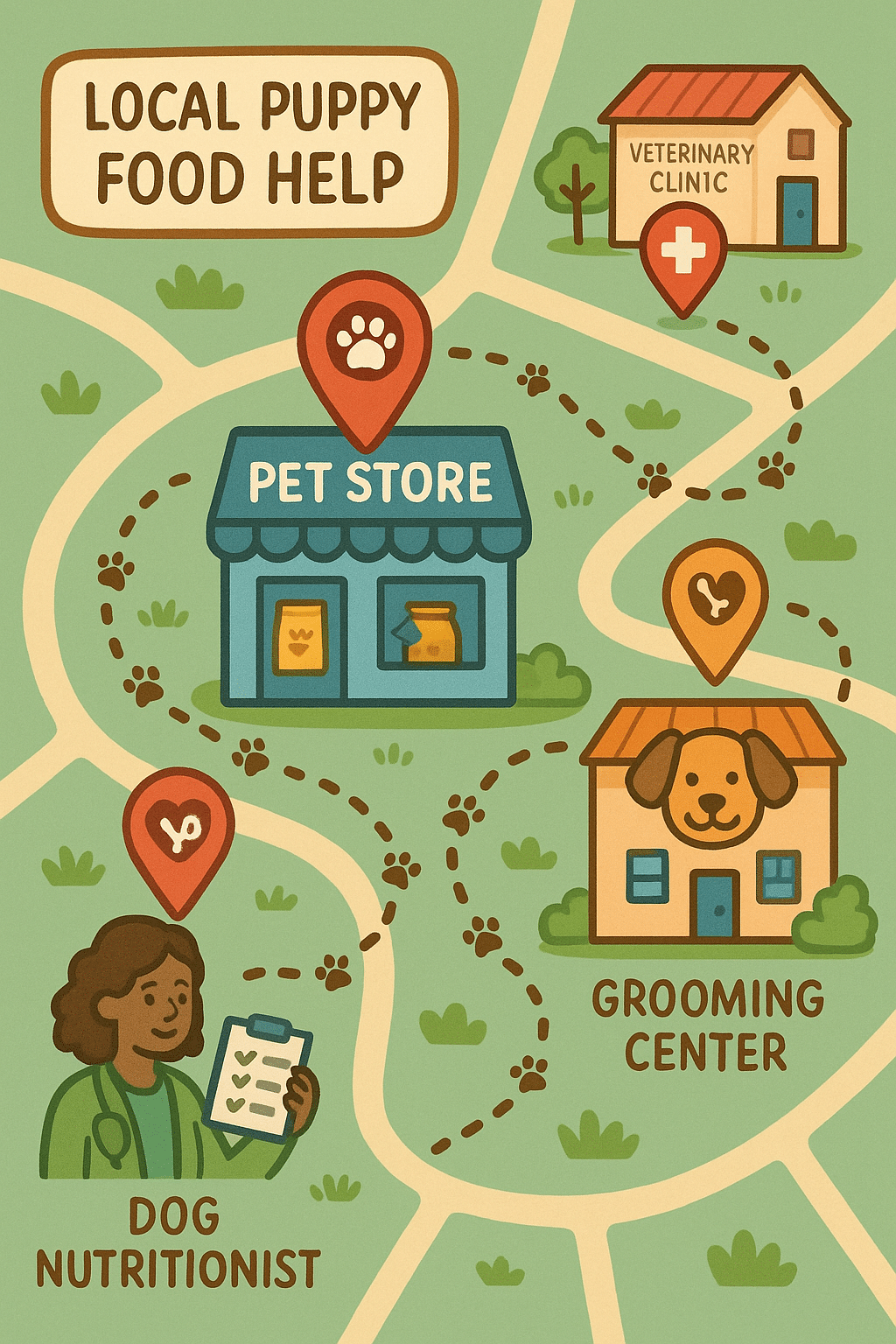
Signs Your Puppy Needs a Special Diet
Symptoms like chronic diarrhea, vomiting, constant itching, or excessive gas may signal the need for sensitive or hypoallergenic formulas.
Safe Introduction of Foods for Sensitive Puppies
Use formulas like Purina Pro Plan Sensitive Skin & Stomach and avoid abrupt food changes. Keep treats and supplements minimal initially.
Beyond Food: Enhancing Puppy Health with Balanced Care
Supplementing Puppy Diets for Immune Support and Digestive Health
While quality puppy foods often cover micronutrient needs, supplements such as probiotics or DHA chews can provide an extra wellness boost, especially if recommended by your vet.
Importance of Hydration: Incorporating Wet Food and Fresh Water
Always provide fresh water. Including wet food occasionally can aid hydration and add variety.
Regular Veterinary Checkups for Diet Assessment
Veterinary visits help monitor development milestones, offering an opportunity to adjust diet plans or address emerging health issues early.
Where to Buy the Best Puppy Food Locally: Retailers and Trusted Online Sources
Comparing Prices and Availability in Local Pet Stores
Major pet store chains such as PetSmart, Petco, and local specialty shops usually stock the top brands reviewed here. Local prices may vary, so don’t hesitate to shop around or inquire about bulk discounts.
Pros and Cons of Buying Puppy Food Online vs. In-Store
- Online: Convenience, subscription options, wide selection, but shipping delays can occur.
- In-store: Immediate product access and personalized advice, yet sometimes pricier and limited stock.
Subscription Services and Bulk Buying Tips
Many retailers offer subscription plans with discounts and automatic deliveries to keep your puppy’s food coming without interruption. Considering the volume, bulk bags often save money but ensure proper storage to maintain freshness.
Unique Insight: How Personalized Puppy Diets Using Breed, Activity Level, and Health Data Are Emerging
Technology and veterinary science are increasingly enabling personalized puppy diets tailored precisely to breed characteristics, activity patterns, and genetic predispositions. AI-driven meal plans and custom-formulated diets promise to revolutionize puppy nutrition, offering optimized health outcomes.
Veterinarians now frequently recommend genetic and metabolic testing combined with tailored feeding regimes. In the near future, expect to see more custom puppy food formulations geared to individual wellness rather than generic breed categories.
FAQs about the Best Puppy Food
Q1: What is the best puppy food for large breeds prone to hip dysplasia?
A: Large breed-specific foods like Hill’s Science Diet Large Breed Puppy or Royal Canin Size Health Nutrition Large Puppy are ideal. They have controlled calcium and phosphorus levels and joint-supporting ingredients to reduce risks of hip dysplasia.
Q2: Can I feed my puppy wet food exclusively?
A: Wet food can be fed exclusively, especially for puppies who need extra hydration or have dental issues. However, dry food is beneficial for dental health and is often more economical. Mixing both is a common practice.
Q3: How do I transition my puppy to a new food without causing stomach upset?
A: Gradually introduce the new food over 7-10 days, increasing the new food portion slowly while decreasing the old food. Watch for any digestive disturbances and consult your vet if issues persist.
Q4: What ingredients should I avoid in puppy food for sensitive stomachs?
A: Avoid fillers like corn, soy, wheat, artificial colors, and preservatives. Opt for limited ingredient diets with proteins like salmon or turkey and easily digestible carbohydrates like rice.
Q5: Are premium puppy food brands worth the extra cost?
A: Yes, premium brands often provide better ingredient quality, balanced nutrients, and transparency, which contribute to healthier growth, stronger immunity, and fewer food sensitivities.
Quick Takeaways / Key Points
- Puppies require balanced nutrition with quality protein, DHA, calcium, and antioxidants for optimal growth.
- Large and small breed puppies have distinct dietary needs; choose breed-specific formulas.
- Ingredient transparency and natural components are critical indicators of quality puppy food.
- Dry food supports dental health; wet food aids hydration and palatability.
- Sensitive puppies benefit from hypoallergenic and limited ingredient diets.
- Feeding guidelines based on age, weight, and activity are essential; gradual food transitions prevent digestive upset.
- Local and online retailers provide various purchasing options; bulk and subscription plans can offer savings.
- Personalized nutrition using breed, health, and activity data is an emerging trend in canine care.
Conclusion
Finding the best puppy food can feel like navigating a maze, but with a clear understanding of nutritional needs and product quality, you can confidently safeguard your puppy’s health and happiness. Each of the seven foods reviewed here brings unique benefits to meet different puppy profiles—whether you need controlled growth for a large breed, a sensitive formula for a delicate tummy, or robust protein for a bustling bundle of energy.
Remember, your puppy’s wellbeing is a lifelong investment. Quality food combined with attentive care, regular vet visits, and a loving environment create the foundation for a thriving canine companion. So go ahead, explore these products from trusted sources like PetSmart, Petco, and official brand sites, and choose the best fuel for your four-legged friend’s journey.
Your puppy’s tail-wagging future starts with the right bite today!



